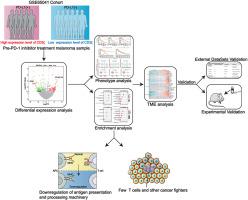Molecular and Cellular Probes ( IF 3.3 ) Pub Date : 2023-09-28 , DOI: 10.1016/j.mcp.2023.101925 Zhuo Zhang 1 , Duoli Zhang 2 , Fang Wang 1 , Jiao Liu 3 , Xian Jiang 4 , Songyot Anuchapreeda 5 , Singkome Tima 5 , Zhangang Xiao 2 , Suwit Duangmano 5

|
Malignant melanoma is the most lethal form of skin cancer, and its incidence rates are increasing in Europe, America, and Oceania countries. Despite immune checkpoint inhibitors, such as PD-1 inhibitors, have been shown to have significant therapeutic effects on malignant melanoma, many patients are unresponsive to these treatments, even emerged resistance. There is an urgent need to discover novel biomarkers that might distinguish resistant patients from responders. In this study, we used a series of bioinformatics analyses and experimental validation. The GSE65041 was used for differential expression analysis. Kaplan-Meier was used to assess the prognostic value. ESTIMATE, ssGSEA, EPIC, TIMER, quanTiseq and MCPcounter for estimation of immune infiltration in the tumor microenvironment. We eventually identified that CD3ζ was significantly down-regulated in IHC PD-L1(−) melanoma patients. Low level of CD3ζ expression possessed a poor prognosis. CD3ζ low expression population is significantly associated with lower immune infiltration. In vivo experiment, CD3ζ expression was significantly down-regulated in mice melanoma after intradermally injected with B16–F10R cells. Compared to their wildtype counterparts, melanoma resistant mice treated with nivolumab showed significant reductions in tumor volume and weight when adding CD3ζ. In vitro experiment, the addition of CD3ζ increased nivolumab effection on inhibiting B16–F10R cell viability. Our findings indicated that CD3ζ could be a novel predictive biomarker of PD-1 inhibitor resistance in melanoma.
中文翻译:

CD3δ 作为黑色素瘤 PD-1 抑制剂耐药性的新型预测生物标志物
恶性黑色素瘤是最致命的皮肤癌,其发病率在欧洲、美洲和大洋洲国家呈上升趋势。尽管PD-1抑制剂等免疫检查点抑制剂已被证明对恶性黑色素瘤具有显着的治疗效果,但许多患者对这些治疗没有反应,甚至出现了耐药性。迫切需要发现新的生物标志物来区分耐药患者和应答者。在这项研究中,我们使用了一系列生物信息学分析和实验验证。GSE65041用于差异表达分析。Kaplan-Meier 用于评估预后价值。ESTIMATE、ssGSEA、EPIC、TIMER、quanTiseq 和 MCPcounter 用于估计肿瘤微环境中的免疫浸润。我们最终发现 CD3ze 在 IHC PD-L1(−) 黑色素瘤患者中显着下调。CD3ze表达水平低者预后较差。CD3ze 低表达群体与较低的免疫浸润显着相关。体内实验发现,小鼠黑色素瘤皮内注射B16-F10R细胞后,CD3δ表达显着下调。与野生型小鼠相比,接受纳武单抗治疗的黑色素瘤抗性小鼠在添加 CD3 z 时表现出肿瘤体积和重量显着减少。体外实验中,添加 CD3ze 增强了 nivolumab 抑制 B16-F10R 细胞活力的作用。我们的研究结果表明 CD3 z 可能是黑色素瘤中 PD-1 抑制剂耐药性的新型预测生物标志物。



























 京公网安备 11010802027423号
京公网安备 11010802027423号